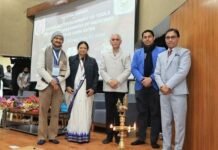
Mumbai, Sep 5: Ten outstanding Indian novels in English along with translations from Indian languages by veterans as well as debut authors were long listed on Wednesday for the Rs 25 lakh JCB Prize for Literature, with its literary director highlighting “enormous diversity” in the submissions.
The longlist features two novels in translation: “Poonachi or The Story of a Black Goat”, originally written in Tamil by Perumal Murugan and Malayalam novel “Jasmine Days” by Benny Daniel; two novels by debut women writers: “Latitudes of Longing” by Shubhangi Swarup and “Empire” by Devi Yesodharan; and two novels by authors previously nominated for the Man Booker Prize: “All The Lives We Never Lived” by Anuradha Roy and “The Book of Chocolate Saints” by Jeet Thayil.
They are joined by veteran writers Nayantara Sahgal and Kiran Nagarkar, whose “When The Moon Shines by Day” and “Jasoda” released to prominence and reflected the burden of society in 2017.
While the entry of Amitabha Bagchi’s “Half the Night is Gone” that explores the inner and outer lives of the men in two families, was almost expected, Chandrahas Choudhury’s “Clouds” was the surprise novel in the longlist.
Entries for the inaugural edition of the prize, an initiative of the earth moving and construction equipment company JCB India Ltd, came from writers in 19 states and 22 per cent of them were translations.
“The most striking thing about the entries we received is their enormous diversity. We had entries from 17 states and eight languages. The oldest author was nearly seven decades older than the youngest. There were books about ancient Indian history and mythology, books about ecological disasters, books about religious strife and the situation of women. All in all, it was a very exciting set of books, which represents the full set of possibilities of the novel,” Rana Dasgupta, Literary Director of the prize told IANS.
The British Indian novelist and essayist further noted that many of the translations were from Malayalam and Kannada. He said that it is no longer possible to “generalise” as novels in Indian languages are “as cosmopolitan as any other”.
“Writers in these languages set their novels in locations all across the world, and they have a great contemporaneity of form, character and language. In future years, translated fiction will make up a much greater share of entries to the Prize,” Dasgupta maintained.
Scholar Rohan Murthy, writers Priyamvada Natarajan and Vivek Shanbhag, and author-translator Arshia Sattar comprise the jury with film director Deepa Mehta chairing the panel.
Of the 10 novels, the jury will shortlist five, which will be announced on October 3. The five shortlisted writers receive Rs 1 lakh each.
The final award will be presented to the writer of the winning novel on October 27. If the winning work is a translation, the translator will be awarded an additional Rs 5 lakh.
The winning novelist will be awarded Rs 25 lakh, the highest for a prize of its kind in India.
Source: IANS


























